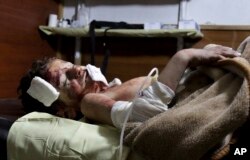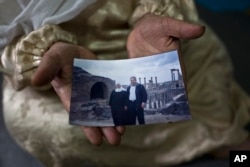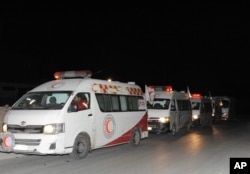A Syrian volunteer group has pleaded for immediate help from the international community and aid organizations to help stop the massacre of civilians by Syrian regime forces in Eastern Ghouta, one of the remaining rebel-held areas in Syria.
Regime forces have stepped up their airstrikes and ground operations against rebels in the region in recent weeks. Siraj Mahmood, a spokesperson for the White Helmets rescue group in Eastern Ghouta, told VOA that civilians were being targeted indiscriminately and that the regime was attacking towns and villages with everything it had.
This wasn't the first time that the regime had breached the de-escalation agreement, Mahmood said, "but this time the attacks came with an unexpected ferocity," with the support of Russian jets. "We documented attacks on markets, schools and mosques."
The volunteer group said more than 180 people had been killed in government shelling and air raids in Eastern Ghouta over the last three weeks. Dozens of children were among those killed, it said.
The group called upon national and international humanitarian organizations to intervene and help save civilians caught up in the firefight.
"Due to the critical living conditions of civilians in Eastern Ghouta, we call all civil and human rights entities, local and international, to interfere and save Ghouta, and to [put] pressure on active parties in order to halt the military attacks and allow medical aid and an evacuation of civilians," the White Helmets said in statement.
Who controls Eastern Ghouta?
Eastern Ghouta, part of a larger agricultural area surrounding Damascus called Ghouta, is controlled by Faylaq al-Rahman and Jaysh al-Islam rebels.
The area is included in the so-called de-escalation zone, part of an agreement with rebel groups brokered in 2017 by Turkey, Iran and Russia to allow much-needed humanitarian aid to reach besieged areas. The agreement also covers parts of Idlib province, northern Homs and parts of southern Syria.
But the Syrian regime has not agreed to the de-escalation agreement, nor has it stopped attacks on the areas, despite the fact that its ally Russia was a party to the deal.
According to Syrian Observatory for Human Rights, a U.K.-based rights group monitoring the situation in Syria, since December 29 2017, regime forces and their allies have pounded Eastern Ghouta with more than 350 airstrikes, killing nearly 200 civilians, including dozens of women and children.
Under siege
Eastern Ghouta has been under siege for five years, with almost 400,000 people still living in the area subject to daily regime attacks.
In 2013, Ghouta was struck by surface-to-surface rockets carrying sarin gas, an internationally prohibited chemical agent, killing more than 1,400 civilians.
Despite the international outcry after the chemical attack and subsequent demands by the U.S.-led international community that the regime dismantle its chemical weapons arsenal, rights groups in Syria allege that limited use of sarin by regime forces persisted over the years in different locations.
For several weeks, local and international organizations have called on the Syrian regime to allow the evacuation of critically ill civilians from Eastern Ghouta, mainly children suffering from chronic conditions like cancer, without major success.
Last week, the Syrian American Medical Society announced that the regime had allowed only 29 out of the already approved list of nearly 500 critically ill patients to be evacuated from the area for treatment.
Staffan de Mistura, the U.N. special envoy for Syria, criticized the regime for failing to permit the medical evacuations. He said civilians, especially children, have the right to be evacuated.
During a press briefing last month in Geneva, de Mistura said there were 282 people in Eastern Ghouta who were in need of specialized surgery or treatment.
"There are 73 severe cancer cases, 25 kidney failure cases and 97 heart disease cases, very concerning," he said, as well as five acutely malnourished children and six acute mental health cases that needed to be evacuated.







